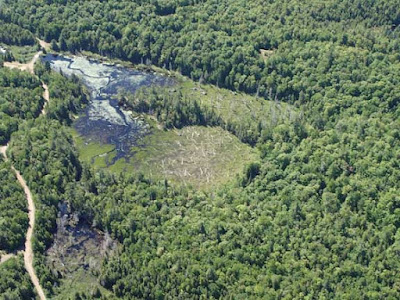MARQUETTE -- Local environmental groups Save the Wild U.P. (SWUP) and the Upper Peninsula Environmental Coalition (UPEC) will co-host "Save the Michigamme Highlands," an informational forum concerning threats to Marquette County’s last stretch of wild lands. The forum will take place from 6 p.m. to 8 p.m. on Tuesday, March 1st, in the Community Room of the Peter White Public Library in Marquette. The event is free and open to the public.
The primary threat to this region remains the twice-defeated County Road 595 (CR-595) proposal, which is the subject of ongoing lawsuit brought by the Marquette County Road Commission (MCRC) against the Environmental Protection Agency (EPA). The contentious CR-595 plan would have torn open the wild heart of Marquette County, pushing a paved mining haul road disguised as a "county road project" through 22 miles of remote wild lands, fragile wetlands and critical wildlife corridors, and necessitating stream and river crossings of the Dead River, Escanaba River, Mulligan Creek, Voekler Creek and Wildcat Canyon, Yellow Dog River, and many more.
This aerial photograph shows Wildcat Canyon Creek wetlands and the proposed 595 route (2015). (Photo courtesy Save the Wild U.P.)
Tuesday’s forum will offer an overview of the Michigamme Highlands and discuss federal objections to wetlands destruction along the CR-595 route, the lawsuit brought by the Marquette County Road Commission, the role of "dark money" in funding the lawsuit, recent road work that has taken place along the route, and other emerging threats.*
"Save the Michigamme Highlands" will feature mini-presentations addressing rare plants in the path of CR-595, basic elements of the MCRC lawsuit, the importance of interconnected "Wild Lands," the EPA’s 2015 Clean Water Rule, the beauty of remote wetlands as seen through the eyes of artists who visited Wildcat Canyon Creek in 2015, and more. Speakers include Jon Saari, Northern Michigan University professor emeritus of history and vice president of Save the Wild U.P.; Catherine Parker, concerned citizen and environmental advocate; Gene Champagne, spokesman for the Concerned Citizens of Big Bay; Michelle Halley, local attorney; Steve Garske, botanist and SWUP board member; Kathleen Heideman, SWUP’s president; and Alexandra Maxwell, SWUP’s executive director.
In 2015, Save the Wild U.P. focused their outdoor summer programming on multiple threats posed by the CR- 595 proposal. They led concerned citizens on several well-attended hikes at remote locations ranging from Pinnacle Falls to the Mulligan Creek wetlands.
SWUP Summer Fellows at the Dead River (2015). (Photo courtesy Save the Wild U.P.)
SWUP Summer Fellows at the Dead River (2015). (Photo courtesy Save the Wild U.P.)
"This stretch of wild land is irreplaceable. The Michigamme Highlands are ideal habitat for moose and other wide-roaming mammals, rich with creeks, rivers and wetlands, and home to the narrow-leaved gentian, a threatened native species found only in three U.P. counties," said Maxwell. "In addition to the enormous environmental impacts, there’s the very real issue of regulatory capture. Why is our Road Commission so dedicated to building a road-to-nowhere -- for the benefit of one sulfide mine? We don’t even have enough money to fill potholes in Marquette County, much less fix our old bridges. Who is the Road Commission serving, if not taxpayers?"
Maxwell said the cumulative impacts of road construction in this environmentally sensitive area must be calculated.
“Any road construction in this environmentally sensitive area must be seen as part of a network of actions related to CR-595," Maxwell explained. "We need to be ever-vigilant to stop creeping incrementalism -- a new bridge here, a gravel mine there, and lots of wetland destruction all along the way. The CR-595 proposal remains a bad deal for taxpayers and the environment."
In 2014, SWUP, along with regional environmental allies, alerted citizens to illegal construction along snowmobile Trail #5, which served as the only functional trail through much of this isolated region.
Marquette County Trail #5, 2014, before road work. (Photo courtesy Save the Wild U.P.)
Kathleen Heideman, SWUP president, noted, "The EPA’s position was clear: no CR-595 route may be constructed without permits from the U.S. Army Corps of Engineers."
Marquette County Trail #5, 2014, after road work by Plum Creek. (Photo courtesy Save the Wild U.P.)
Heideman said the forum is an opportunity for the public to learn why this stretch of wild lands needs to be protected -- for its clean water and its contribution to a better quality of life for all U.P. residents.
"Our organizations remain outspoken opponents of the CR-595. The damage would be too great, period," said Heideman.
* Editor's Note: See Louis V. Galdieri's recent article, A Postscript on the Political Project of MCRC v. EPA.











































































































































No comments:
Post a Comment